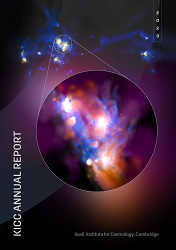
Submitted by S. Brereton on Thu, 11/05/2023 - 16:14
Having a programme approved for observing with the JWST is no easy feat. This space telescope is probably the most sought-after facility today, yet researchers at the Kavli Institute of Cosmology and Institute of Astronomy were extraordinarily successful, with seven approved proposals (as PI or Co-PI), a testament to the vision, capabilities and dedication of our staff and students.
All together, these programmes total over 320 hours of JWST time, spanning from studies of relatively near exoplanets to the first generation of stars in the primordial Universe.
Congratulations to:
Francesco D'Eugenio: "We aim to investigate how the central supermassive black hole stopped star formation in a massive galaxy just
800 million years after the Big Bang."
Hannah Uebler and Roberto Maiolino: "We want to search for signatures of the first stars, so-called Population III stars, around seven low-metallicity galaxies at 7<z<10. Our setup with the NIRSpec IFS mode is motivated by modern theoretical models, and a detection would be a major discovery for observational astronomy."
Jan Scholtz: "We aim to study the dynamics of the first massive galaxy discs at Cosmic Dawn."
Nikku Madhusudhan "We will look into the atmosphere of exoplanets searching for elusive traces of methane"
Roberto Maiolino (Co-PI with Daniel Eisenstein at Harvard University): "We aim to discover the first galaxies, in the first 250 million years of the Universe"
See the full list here


